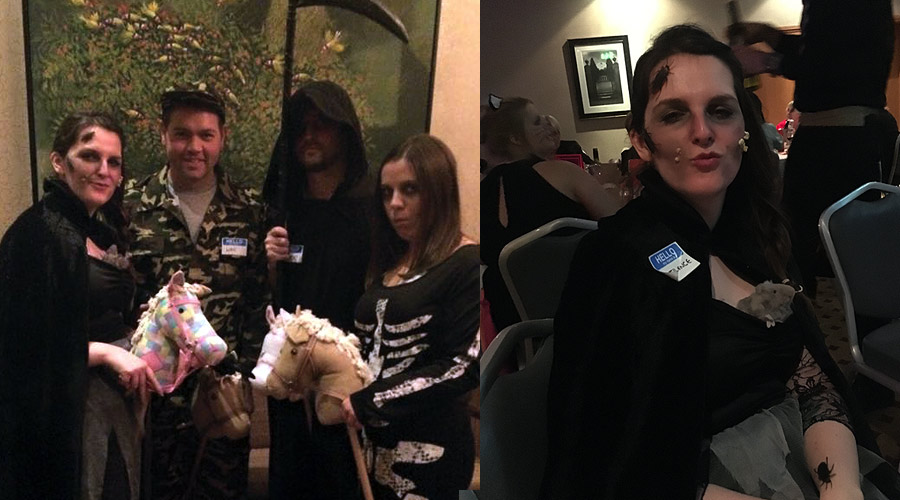
It’s Sunday night and I’m just home from one of Joy Swift’s Original Murder Mystery Weekends – delightful, deathful, and a real mouthful.
With a stressful, finish-all-of-the-things! week at work followed by a stressful, solve-all-the-mysteries! weekend away from my laptop, Cuthbert didn’t get very much love this week, and I wasn’t sure what I was going to write about. I figured ‘hey guys, I’m still not sure what to name this character‘ wouldn’t be a riveting read. (Though it might sound more appealing come the blog post deadline next week…)
But as I sat down this morning to hear the murder mystery’s Poirot-style denouement explaining the murderer and motives, I was really struck by the balancing act of creating a good puzzle, something that’s solvable without being easy and challenging without making people go, ‘Wait, what?’
It’s something I’ve touched on before, and it’s strangely reassuring to know other people – people who get paid real cash money to make games for a living – have the same problems I do working out where to draw the line.
I’m not going to talk in any specific details about the murder mystery weekend so it doesn’t spoil the fun for anyone else, but the basic idea was a group of James Bond fans (and extras and stunt drivers and innuendo-name-maker-uppers) gathered together in a beautiful country house for a conference – when gruuuuuesome muuuuuurders began to happen.
The story began on Friday night and finished on Sunday, with a group of (fast-witted and, it goes without saying, really, really ridiculously good-looking) actors playing the roles of victims, murderers, red herrings, and detectives, constantly on, constantly improvising answers and lies to us nosy would-be sleuths, letting clues slip, having heated and noisy arguments – all while running a full-on weekend full of trivia quizzes, team games, discos, and costume competitions. (Which we placed second in I-thank-you-very-much.)
 Because who could resist that pestilent face?
Because who could resist that pestilent face?
It was extremely well-done, and something I was thrilled to discover existed outside of 90s sitcoms full of hilarious misunderstandings; the actors would constantly answer questions and act out little side-scenes, but the important bits would only get revealed at points when the whole group was together. Throughout the weekend, evidence would be pinned up in an ad-hoc police incident room – texts, post-it notes, newspaper clippings – some meant as red herrings, some to fill out the main and side plots, and some to point you in the right direction, and guests were encouraged to read them, to figure it all out.
The only problem was: no one did.
Not just in our group: after the curtain calls, the story writer, company creator, and a twidge intimidating star of the production, Joy Swift, confessed no one had successfully unravelled the full mystery in the time they’d been running the plot we saw; while a third or so of the group (including us, I-thank-you-very-much) worked out whodunnit, no one worked out exactly why. No one unravelled the full, complicated story and reasoning the game creator had put in there.
There weren’t slapped heads, there weren’t of courses: what had seemed enough to the writer wasn’t clear to her audience at all. And it proved to be a bit of a theme of the weekend.
Alongside the main game, the company put on some light entertainment – quizzes, a rather ingenious competitive take on Pictionary, and a treasure-hunt-cum-cryptic-clue puzzle based around people related to the James Bond series.
Knowing next to nothing of the James Bond series, my team’s modest thirty-six and a half out of fifty-five (mostly owing to a ‘that sounds like it could be a name, put it down!’ mentality) wasn’t bad, but even true fanatics were stumped by some of the clues. The entire room groaned when one particularly punny answer was given: no one had been able to work it out. And, while we could all see the logic in hindsight, it had been impossible to work out with what we’d been given.
Well. ‘Impossible’ is a harsh word. But when there are other clues to solve – or other games to play – a puzzle that’s too frustrating, too difficult to get a grasp on, too built around the writer’s own unique jumps of logic might as well be.
As we discovered in the few hours of free-time we found between costume competitions and utterly failing to work out the murder case when we cracked open our brand new copy of Codenames, the board game.
 Pictured: your friends playing Codenames. DollarPhotoClub
Pictured: your friends playing Codenames. DollarPhotoClub
The basic premise – as I explained to my partner, my friends, and all the actors and hotel guests who stopped to work out what the heck we were doing – is one person on a team has to direct the others to particular words laid out on cards in front of them, but can only say one word (crucially one that’s not on the table) and one number, which is the number of cards their clue refers to. There was a stonking win for ‘scientology, two’ in relation to ‘space’ and ‘pyramid’, for example, but winning relies on people being on your wavelength, getting the places your mind goes when you’re trying to give out hints; and it couldn’t have been more apparent from our game that people’s minds work in very different ways.
I ground my teeth so hard I’m surprised I didn’t swallow any when my partner couldn’t see ‘night’ as something relating to ‘school’; he was indignant when my mind flew to ‘life’ at the clue for ‘death’. And the less said about the shower-pit conundrum, the better. For everyone.
It’s not just the difficulty, it’s not just walking the thin line of what’s challenging and what’s too easy when writing a puzzle, it’s working out if anyone else even thinks the way you do.
The monkey wrench puzzle from Monkey Island is probably a good example of this – I will never believe anyone who tells me the solution leapt to mind, especially in a game where most puzzles make perfect (in-world) physical sense.
 Look at that face. He knows he’s done wrong. LucasArts
Look at that face. He knows he’s done wrong. LucasArts
Sure, once you know the answer you can see where it came from, how it fits in. But before then, nothing works. And if you can’t make the exact same mad leap of logic the creator did, if you haven’t seen the same shows or read the same books or been hit over the head with the same blunt object, you’re just not going to be able to come to a conclusion.
If I take one thing from this weekend (aside from the second place prize, the certificate of merit, and the endless memories of time well-spent in good company that I’ll treasure forever) it’s that, if Cuthbert is going to work well, I’m going to have to see if my puzzles make sense to people who aren’t me.
Or murder everyone who says they’re rubbish.








